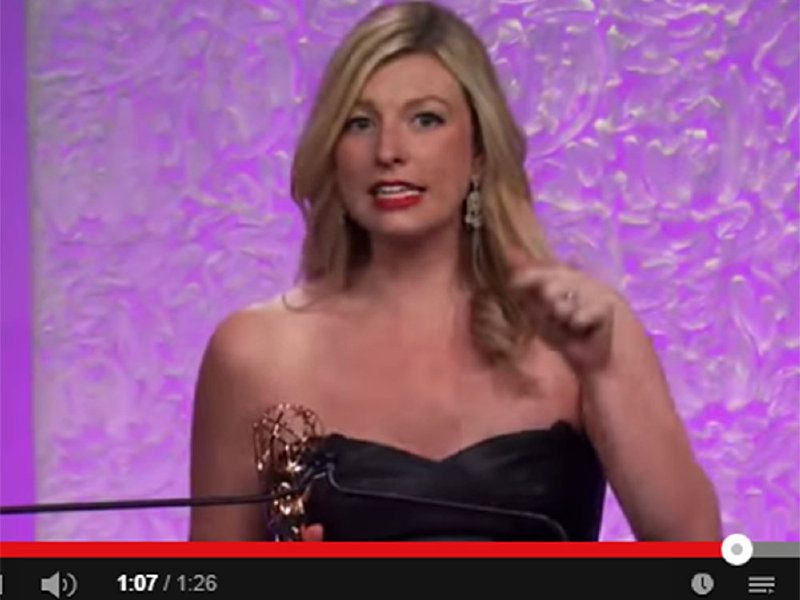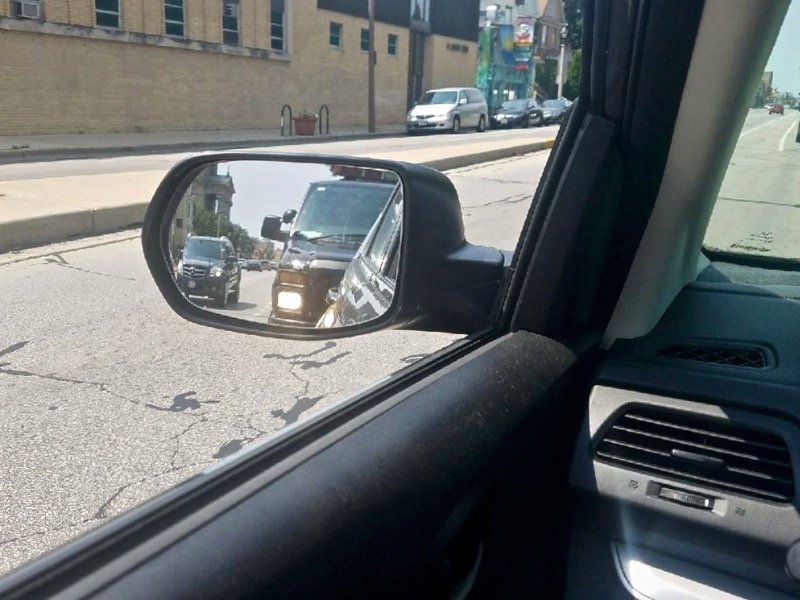Recognition for work well done is always appreciated. When that support and accolades come from one’s peers, it can mean even more.
In the broadcast world, there are a number of these types of awards, but the ones from the National Academy of Television Arts and Sciences – the Emmys – mean the world to those of us who have worked on both sides of news content or advertising.
I can’t speak of what is running in someone else’s head when they find out they have won an Emmy, but I can relate to my personal experience when I won one of the two I was nominated for in my career. It was a pleasure to work on a project, and I was thankful for the recognition.
For Meghan Dwyer, an investigative reporter at WITI-TV Fox 6, her reaction was a little different when she picked up an Emmy for a story on bullying called "Scared at School."
The trade publication TV Spy shared this event earlier this week.
"I’m way more excited than I should be," Dwyer said on the way to the podium.
"This is for all the kids that are bullied. Seriously, public schools suck. They’re horrible. They need to be held accountable. I tried to do this with Milwaukee Public Schools."
You can see her acceptance speech here:
When paired with the clip of the story that plays on the big screen during the ceremony, her comments seem to be in support of one of the sources she uses in the report. In the context here, her opinion seems a little out of place and the audience reaction in the room seems to have her soften her stance.
"I love public schools, my kids will go there, but they need work," she said before stepping away. "Sorry. That’s the story."
John LaPorte, the VP of news at WITI, shared some thoughts after the comments were made by Dwyer.
"We are proud of the work Meghan has done at FOX 6," he told TV Spy.
"Her comments during an acceptance speech for one of two Emmy awards she won were unfortunate and misplaced. We have spoken with Meghan at length and she has made it very clear that she misspoke as she was caught up in the excitement of the evening."
Earning an Emmy, or other award chosen by peers, is a great honor. It means that for the last year the work, and the work of the team at the station, was among the best. WITI had 26 nominations and the staff came back home to Milwaukee with 12 Emmys bundled in their arms after the ceremony in Chicago. That’s a great night, and one, I’m sure, filled with excitement.
Is everyone entitled to an opinion? Sure they are.
Can credibility be damaged and some sort of bias be assumed before the reporter works on another, similar report? That perception can hold true as well.
This is the slippery slope between commentators and objective reporters.
In a world where talk show hosts with a slant share the same airwaves as news people do, it makes it tougher on the audience to tell the difference.
Erin Richards, who covers education for The Milwaukee Journal Sentinel, said she hasn’t seen something to this extent before.
"I've never seen a reporter make that kind of overt and opinionated comment in a public setting before. That doesn't mean it hasn't happened; I just haven't witnessed it," she said.
Based on the reactions, many were taken aback by Dwyer’s words. If not by what it was that was said, the time and place it was delivered seemed out of place.
"I wasn't at the event -- one of our video editors was -- but it's clear from the crowd's reaction that there were some people in the audience that took Dwyer's comments personally," Richards said.
"And based on the reaction on social media, such a blanket comment about the state of schools didn't exactly win over a lot of public school parents and teachers. Though I would venture to say she didn't exactly verbalize anything a lot of people haven't already said. It's just that the standards are higher when you're a reporter. The trade-off in this gig is having to keep your personal feelings to yourself as much as possible."
For a number of reasons, working the education beat for a community can be very complex. Through different models of education used in different systems, the definition of "right" can vary based on philosophies. Richards said that accurately presenting areas of concern for children and families and working on access to teachers and administrators can prove to be challenging.
When working a beat, especially over time, relationships are made and opinions are formed during the time of coverage. It is all based on the experience.
When illustrating this for students I’ve taught in higher education, I share my opinions about former Green Bay Packers quarterback Brett Favre. After his playing career was over, I made it no secret that I had no love for Favre. Every time he hemmed and hawed about continuing to play professional football meant longer and longer hours for me at work.
As an editor or producer at the time, it would have been unfair of me to make news value judgments on what Favre accomplished on the field of play to be clouded based on his inability to make a decision.
In this situation where Dwyer commented on public schools when accepting her Emmy, we would only be guessing on what the experience was that shaped her opinion. We never really know what someone means to say; we are left with what was said at that moment.
The irony isn’t lost when reading the opinionated comments on social media and elsewhere about when and where to share opinions.
From a mass media perspective, the question doesn’t have to be whether public schools suck or not. That opinion can be held, debated and shared with thousands of other people as it was in the past 48 hours.
What I’m truly afraid of, is if the notion of objective reporting is lost on those we are holding to a higher standard of being objective in the first place … or at the very least, the reporters we are giving awards to.
Media is bombarding us everywhere.
Instead of sheltering his brain from the onslaught, Steve embraces the news stories, entertainment, billboards, blogs, talk shows and everything in between.
The former writer, editor and producer in TV, radio, Web and newspapers, will be talking about what media does in our community and how it shapes who we are and what we do.







